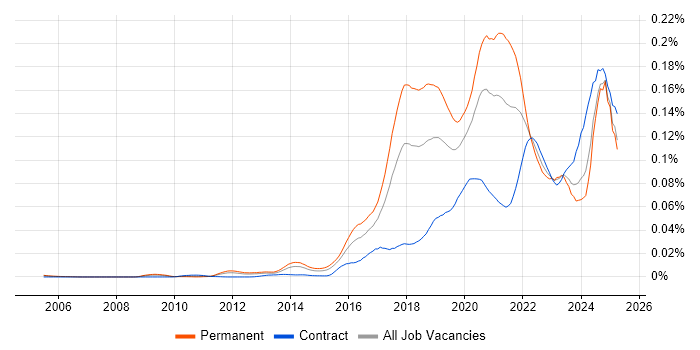Machine Learning Engineer
UK
The median Machine Learning Engineer salary in the UK is £95,000 per year, according to job vacancies posted during the 6 months leading to 7 May 2025.
The table below provides salary benchmarking and summary statistics, comparing them to the same period in the previous two years.
| 6 months to 7 May 2025 |
Same period 2024 | Same period 2023 | |
|---|---|---|---|
| Rank | 582 | 884 | 883 |
| Rank change year-on-year | +302 | -1 | +130 |
| Permanent jobs requiring a Machine Learning Engineer | 118 | 28 | 97 |
| As % of all permanent jobs advertised in the UK | 0.22% | 0.028% | 0.094% |
| As % of the Job Titles category | 0.24% | 0.030% | 0.10% |
| Number of salaries quoted | 109 | 20 | 85 |
| 10th Percentile | £76,727 | £53,500 | £48,000 |
| 25th Percentile | £77,000 | £65,000 | £61,700 |
| Median annual salary (50th Percentile) | £95,000 | £75,000 | £75,000 |
| Median % change year-on-year | +26.67% | - | +7.14% |
| 75th Percentile | £100,000 | £91,250 | £86,250 |
| 90th Percentile | - | £98,250 | £99,500 |
| UK excluding London median annual salary | £92,626 | £75,000 | £65,000 |
| % change year-on-year | +23.50% | +15.38% | +6.12% |
All Permanent IT Job Vacancies
UK
For comparison with the information above, the following table provides summary statistics for all permanent IT job vacancies. Most job vacancies include a discernible job title that can be normalized. As such, the figures in the second row provide an indication of the number of permanent jobs in our overall sample.
| Permanent vacancies in the UK with a recognized job title | 49,015 | 93,487 | 94,651 |
| % of permanent jobs with a recognized job title | 90.41% | 94.63% | 91.53% |
| Number of salaries quoted | 27,518 | 67,038 | 59,603 |
| 10th Percentile | £30,000 | £28,500 | £32,500 |
| 25th Percentile | £42,000 | £38,500 | £45,000 |
| Median annual salary (50th Percentile) | £57,500 | £52,550 | £60,000 |
| Median % change year-on-year | +9.42% | -12.42% | - |
| 75th Percentile | £75,000 | £71,250 | £81,250 |
| 90th Percentile | £97,500 | £90,000 | £100,000 |
| UK excluding London median annual salary | £52,000 | £50,000 | £53,000 |
| % change year-on-year | +4.00% | -5.66% | +6.00% |
Machine Learning Engineer
Job Vacancy Trend
Job postings that featured Machine Learning Engineer in the job title as a proportion of all IT jobs advertised.

Machine Learning Engineer
Salary Trend
3-month moving average salary quoted in jobs citing Machine Learning Engineer.
Machine Learning Engineer
Salary Histogram
Salary distribution for jobs citing Machine Learning Engineer over the 6 months to 7 May 2025.
Machine Learning Engineer
Top 16 Job Locations
The table below looks at the demand and provides a guide to the median salaries quoted in IT jobs citing Machine Learning Engineer within the UK over the 6 months to 7 May 2025. The 'Rank Change' column provides an indication of the change in demand within each location based on the same 6 month period last year.
| Location | Rank Change on Same Period Last Year |
Matching Permanent IT Job Ads |
Median Salary Past 6 Months |
Median Salary % Change on Same Period Last Year |
Live Jobs |
|---|---|---|---|---|---|
| England | +246 | 105 | £95,000 | +26.67% | 154 |
| UK excluding London | +278 | 90 | £92,626 | +23.50% | 57 |
| North of England | +84 | 25 | £100,000 | +33.33% | 6 |
| South East | - | 23 | £80,000 | - | 31 |
| London | +103 | 21 | £95,000 | +35.71% | 129 |
| East of England | +55 | 17 | £100,000 | +8.11% | 7 |
| Midlands | +67 | 14 | £88,500 | +18.00% | 3 |
| North West | +23 | 13 | £85,253 | - | 5 |
| Work from Home | +151 | 11 | £91,250 | +17.74% | 65 |
| Yorkshire | - | 10 | £100,000 | - | |
| East Midlands | - | 8 | £88,500 | - | 2 |
| West Midlands | +46 | 6 | £88,500 | +18.00% | 1 |
| Scotland | +131 | 5 | £77,000 | +33.91% | 3 |
| South West | +123 | 3 | £50,000 | - | 4 |
| Northern Ireland | - | 3 | £100,000 | - | 1 |
| North East | +50 | 2 | £88,500 | +18.00% | 1 |
Machine Learning Engineer Skill Set
Top 30 Co-occurring Skills and Capabilities
For the 6 months to 7 May 2025, Machine Learning Engineer job roles required the following skills and capabilities in order of popularity. The figures indicate the absolute number co-occurrences and as a proportion of all permanent job ads featuring Machine Learning Engineer in the job title.
|
|
Machine Learning Engineer Skill Set
Co-occurring Skills and Capabilities by Category
The follow tables expand on the table above by listing co-occurrences grouped by category. The same employment type, locality and period is covered with up to 20 co-occurrences shown in each of the following categories:
|
|
|||||||||||||||||||||||||||||||||||||||||||||||||||||||||||||||||||||||||||||||||||||||||||||||||||
|
|
|||||||||||||||||||||||||||||||||||||||||||||||||||||||||||||||||||||||||||||||||||||||||||||||||||
|
|
|||||||||||||||||||||||||||||||||||||||||||||||||||||||||||||||||||||||||||||||||||||||||||||||||||
|
|
|||||||||||||||||||||||||||||||||||||||||||||||||||||||||||||||||||||||||||||||||||||||||||||||||||
|
|
|||||||||||||||||||||||||||||||||||||||||||||||||||||||||||||||||||||||||||||||||||||||||||||||||||
|
|
|||||||||||||||||||||||||||||||||||||||||||||||||||||||||||||||||||||||||||||||||||||||||||||||||||
|
|
|||||||||||||||||||||||||||||||||||||||||||||||||||||||||||||||||||||||||||||||||||||||||||||||||||
|
||||||||||||||||||||||||||||||||||||||||||||||||||||||||||||||||||||||||||||||||||||||||||||||||||||
